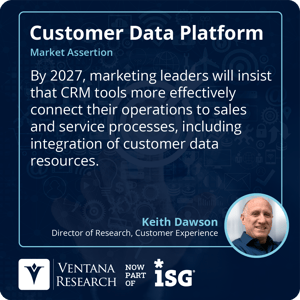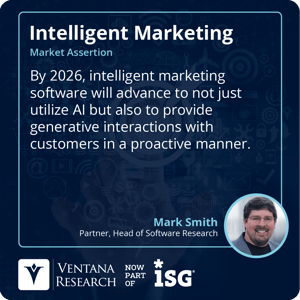Ventana Research recently announced its 2024 Market Agenda in the expertise area of Marketing, continuing the guidance we have offered for nearly two decades to help enterprises derive optimal value from business technology and improve outcomes.
Through 2027, the category of marketing applications will transform to become more intelligent through the infusion of artificial intelligence (AI) and generative AI (GenAI) to meet  the next generation of requirements. That reflects our view that marketing and CMOs are examining how to engage AI to be more effective in their processes and systems. Marketing has been introducing more automation and workflows over the past few years but has yet to truly take advantage of AI to simplify and unify marketing applications to make them more effective and engaging.
the next generation of requirements. That reflects our view that marketing and CMOs are examining how to engage AI to be more effective in their processes and systems. Marketing has been introducing more automation and workflows over the past few years but has yet to truly take advantage of AI to simplify and unify marketing applications to make them more effective and engaging.
Digital tools, including analytics, AI and conversational intelligence, are facilitating a better alignment between brands and the consumer demand for products and services. As the available technology evolves, enterprises need help understanding how to integrate marketing tools and data with those used by other departments, especially those in sales and customer support.
Marketing leaders are starting to grapple with the explosion of data that they can use to measure things like customer value, loyalty and longevity. A lot of this data comes from the digital experiences that customers are using—web, mobile apps, and video—and marketers are using a wide variety of tools to reach and encourage those customers. Some of this is being powered by AI and automation, which has made enormous inroads into marketing teams.
The thematic through line that connects all of this is the need to use better data and tools to increase revenue, reduce cost of engagement and measure all the relevant key metrics. In 2024, we expect to see, and cover, the advances in analytics and AI that enable marketing to do more precise targeting and better engagement.
Marketers have been able to leverage some exciting, advanced technologies that came available in recent years thanks to the cloud, AI and machine learning (ML), and robust data analysis. We are finding that marketing teams have just begun to scratch the surface of what is available and are starting to look closely at tools for product information management, CX orchestration, customer data platforms and journey management to flesh out their initiatives.
At Ventana Research, our Marketing expertise includes six focus areas including Customer Data Platforms, Digital Experience Platforms, Digital Marketing, Product Experience Management and Marketing Performance Management.
Customer Data Platforms
In 2024, we will focus on customer data platforms (CDPs) and how centralizing and de-siloing data management makes for a clearer view into a customer base. CDPs address some of the most important challenges and pain points in customer experience design: inconsistencies in interactions due to fragmented data and complexity of data governance issues. We assert that by 2027, marketing leaders will insist that CRM tools more effectively connect their operations to sales and service processes, including integration of customer data resources. As the amount of customer data grows, better experiences can be built using data-driven contextual cues. At the same time, data proliferation creates operational obstacles. CDPs provide a mechanism for tying each piece of data to a unique customer profile and then acting upon it. We believe that the use of CDPs are a critical component in digital engagement and a requirement of enterprise-class marketing.
most important challenges and pain points in customer experience design: inconsistencies in interactions due to fragmented data and complexity of data governance issues. We assert that by 2027, marketing leaders will insist that CRM tools more effectively connect their operations to sales and service processes, including integration of customer data resources. As the amount of customer data grows, better experiences can be built using data-driven contextual cues. At the same time, data proliferation creates operational obstacles. CDPs provide a mechanism for tying each piece of data to a unique customer profile and then acting upon it. We believe that the use of CDPs are a critical component in digital engagement and a requirement of enterprise-class marketing.
Digital Experience Platforms
Digital experience platforms are tools used by marketers and service teams to create and track customer interactions that primarily occur through new digital-contact channels. Digital customer-contact channels are increasing in popularity and usage, with web portals, mobile apps and social media beginning to rival voice calls. Marketing leadership should think about how consolidating marketing communication applications into a digital experience platform can improve operations and potentially rein in costs. The importance of insights and intelligence from digital experience efforts is critical to optimize and personalize every interaction. A growing new class of technology is becoming readily available for this purpose. By 2027, more than one-half of marketing teams will rely on GenAI to create and manage content for websites, promotions and customer-facing materials. In 2024, we will produce a Buyers Guide to offer more depth on the software provider landscape for the suite of applications, platform, DAM and website, and CMS required to effectively assess and select for marketing transformation.
Digital Marketing
Digital marketing looks at how marketing technology overall is changing to incorporate more types of connections with customers. Intelligent marketing covers some of the emerging technologies and practices that involve AI, ML, automation and some robotic process automation (RPA). The goal of this segment is to provide a mechanism for doing marketing at greater scale and speed while keeping it personal and high touch. We assert that through 2026, over one-third of marketing teams will examine their digital insights and realize they need to invest in analytics that are designed to guide future advancements.
Intelligent Marketing
Intelligent marketing seeks to optimize marketing using insights gained through analytics and ML. Marketing leaders are beginning to address planning and performance efforts in a more concerted manner. We are seeing a shift to predictive and ML techniques to optimize marketing processes and performance; this, increasingly, will be a requirement to be effective. Predictive marketing and AI technologies can help optimize actions and results, but these efforts must be aligned to the goals of the marketing team. By 2026, the needs for intelligent marketing software will advance to not just utilize AI but to provide the generative interactions with customers in a proactive manner.
concerted manner. We are seeing a shift to predictive and ML techniques to optimize marketing processes and performance; this, increasingly, will be a requirement to be effective. Predictive marketing and AI technologies can help optimize actions and results, but these efforts must be aligned to the goals of the marketing team. By 2026, the needs for intelligent marketing software will advance to not just utilize AI but to provide the generative interactions with customers in a proactive manner.
Marketing Performance Management
Marketing performance management is how modern marketing leadership is able to manage the investment and resources to expected goals and outcomes. To accomplish this requires effective planning to maximize the budget return while balancing the external and internal priorities of the CMO and marketing leaders. The utilization of software to manage performance will need to be addressed, and we assert that by 2027, the lack of software for marketing performance management will lead to a new generation of applications designed to meet the needs of effective CMOs.
Product Experience Management
Product Experience Management (PXM) is technology that enables enterprises to improve product engagement by offering consistent management of product and related information to improve experiences for consumers and across the business. Marketing teams are modernizing PIM to support digital experiences across the product life cycle. The transition to the cloud will speed the return on products’ value and intensify the imperative for marketing to provide excellent product experiences. Workflows incorporating ML and RPA enhance product information quality by identifying issues and opportunities for improvement. By 2026, over one-half of enterprises will realize the lack of accurate product information in GenAI deployments will require investments into product experience management software. Product experience management looks at how marketing ensures consistency around product data as that product data makes its way into all the applications and communications channels that an enterprise uses to present it. In 2024, we will expand our Buyers Guide to include focus on PXM for customers vs supply chain and examine platforms for PIM and PXM support. We will also produce a Buyers Guide on product intelligence and analytics software providers.
Our commitment to insightful and impactful research reveals challenges, trends and best practices for marketing teams and enterprises. Our Customer Experience Management and Digital Experience Platform Buyers Guides will evaluate software providers and products using an RFI / RFP framework that provides guidance to help enterprises select the right dedicated systems for their needs.
Subscribe to our Ventana Research community to stay up to date on our 2024 research efforts. Explore our Marketing expertise and topic areas for a detailed research agenda and continuously updated 90-day calendar as well as more research facts and best practices.
Regards,
Keith Dawson

 the next generation of requirements. That reflects our view that marketing and CMOs are examining how to engage AI to be more effective in their processes and systems. Marketing has been introducing more automation and workflows over the past few years but has yet to truly take advantage of AI to simplify and unify marketing applications to make them more effective and engaging.
the next generation of requirements. That reflects our view that marketing and CMOs are examining how to engage AI to be more effective in their processes and systems. Marketing has been introducing more automation and workflows over the past few years but has yet to truly take advantage of AI to simplify and unify marketing applications to make them more effective and engaging. most important challenges and pain points in customer experience design: inconsistencies in interactions due to fragmented data and complexity of data governance issues. We assert that by 2027, marketing leaders will insist that CRM tools more effectively connect their operations to sales and service processes, including integration of customer data resources. As the amount of customer data grows, better experiences can be built using data-driven contextual cues. At the same time, data proliferation creates operational obstacles. CDPs provide a mechanism for tying each piece of data to a unique customer profile and then acting upon it. We believe that the use of CDPs are a critical component in digital engagement and a requirement of enterprise-class marketing.
most important challenges and pain points in customer experience design: inconsistencies in interactions due to fragmented data and complexity of data governance issues. We assert that by 2027, marketing leaders will insist that CRM tools more effectively connect their operations to sales and service processes, including integration of customer data resources. As the amount of customer data grows, better experiences can be built using data-driven contextual cues. At the same time, data proliferation creates operational obstacles. CDPs provide a mechanism for tying each piece of data to a unique customer profile and then acting upon it. We believe that the use of CDPs are a critical component in digital engagement and a requirement of enterprise-class marketing.  concerted manner. We are seeing a shift to predictive and ML techniques to optimize marketing processes and performance; this, increasingly, will be a requirement to be effective. Predictive marketing and AI technologies can help optimize actions and results, but these efforts must be aligned to the goals of the marketing team. By 2026, the needs for intelligent marketing software will advance to not just utilize AI but to provide the generative interactions with customers in a proactive manner.
concerted manner. We are seeing a shift to predictive and ML techniques to optimize marketing processes and performance; this, increasingly, will be a requirement to be effective. Predictive marketing and AI technologies can help optimize actions and results, but these efforts must be aligned to the goals of the marketing team. By 2026, the needs for intelligent marketing software will advance to not just utilize AI but to provide the generative interactions with customers in a proactive manner. 








